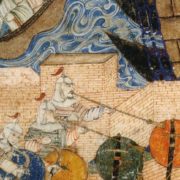I used reading First Things regularly, because it is important to me getting familiar with different ways to understand Catholicism and the Church than mines. And the lecture of First Things has been for a long time a very good exercise into this other way to look at the Catholic Church. Articles published there were brilliant, not arrogant, pungent, and militant. I really appreciated all these aspects.
I dare to say that I learnt a lot from them. Above all, I learnt not to take for granted my perspective on the Church. I learnt that people can have other feelings and takes on Catholicism, and that there are many good reason for that.
I was introduced to First Things by a distinguished author who used to publish some articles there: the late Cardinal Avery Dulles s.j. He felt comfortable with the magazine and its ecclesiological and political stance, and that was enough to me for taking very seriously every piece published by First Things.
Because of that, I always bounded together his style of being a theologian, a Jesuit, a priest, and the content of the articles I could read on First Things. One thing among many I have learnt from him, it is that one can utter a sharp criticism without any lack of respect for the person or the theological view one is dealing with – even in case of the deepest disaccord with the other part.
I do not know yet why, but Cardinal Dulles has been always very kind with me. In some way, he – the old Jesuit – liked me – the young progressive theologian (and journalist with an Italian Catholic magazine that was quite the opposite than First Things). I visited him every time I had occasion to stop in New York for few days. We met in his office at Fordham’s Campus in the Bronx, we talked for hours disagreeing almost about everything, than we had lunch together in the dining room of the Jesuit community on campus. All surrounded by a very friendly atmosphere.
Two different generations, two different cultural backgrounds, two deeply different understandings of the Catholic Church and its mission: and yet, he was always nice to me, asking to call the next time I would have been in New York. Sometimes, I felt like being a sparring partner for him – all beaten up sitting in the train back to downtown Manhattan. Asking myself: Why does he like so much to talk with me? Why does he give me so much of his precious time?
I wasn’t able, and I am not yet able, to give an answer. But I do know two things: I was honored by the chance he gave me to talk and to disagree with him; and, more important, he was a true gentleman. Something like that it is rare. For this reason, I consider a great gift getting familiar with Cardinal Dulles. And I consider a great gift every tiny piece of disagreement we had about the Council, the Church, theological issues, and so on – while I can still feel his warm handshake at the end of the day, with his calm voice saying «see you next time».
Theoretically, each of us should have sat full armed on the other side of the divide produced by the cultural wars. In reality, we chatted, we laughed, we had lunch together. It was not a truce, it was friendship – because he was a true gentleman. For some time, I could find something of his style of arguing in the pages of First Things: criticism without any need of mocking the «adversary», without any trace of violence, just for the sake of the Church.
Than something happened, and suddenly there wasn’t any hint more of that in the pages of First Things.
I miss Cardinal Dulles so much; I miss every day the style of respectful disagreement he taught me. This is his lesson we should never forget. We need so much this style of pungent respect in our Church today… but we are all so lost at sea that we don’t have anymore a clue of what it means being a true gentleman.





